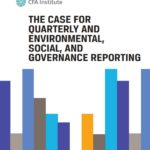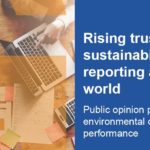Corporate environmental and social reports are playing an increasingly vital role in building trust between companies and their stakeholders. ERM’s latest survey reveals that leading firms are beginning to question what they really want from verification.
In the absence of agreed standards on what their reports should contain, senior managers are looking to verification to sharpen internal performance particularly on ‘softer’ social issues not just to provide a stamp of approval.
As companies move to report on their social and economic performance as well as environmental the so-called ‘triple bottom line’ verifiers will need to provide both credibility checks and learning opportunities. ERM’s survey of the reports of 80 leading companies and interviews with senior managers in a wide range of leading European businesses concluded that verifiers will increasingly be asked to have:
* sympathy with business processes and drivers
* in-depth understanding of environmental and social issues
genuine independence
* robust and transparent approach to allow a company to learn while delivering external credibility
The survey also revealed that:
* 75% of the company reports reviewed had been independently verified and more would soon follow suit
companies increasingly expect more from verification than a stamp of approval and want to use the exercise to take forward their sustainability and responsibility management programmes
choice of verifier depends heavily on
* the main audience for the report
although verification focuses on environmental disclosure and is beginning to encompass social reporting, verification of economic data is still in its infancy
Haddon continued: ‘Industry wants much more from verification than a simple stamp of approval. Our interviewees – all of them from major European multinationals – all agreed that an essential part of the process is to add value by interrogating the systems and identifying inefficiencies or weaknesses for future improvement.’
A minority of interviewees felt that the process in itself informs company management, by asking the right questions and examining the evidence. However, the majority favour a more direct approach with reviewers’ feedback on strengths and weaknesses supported by clear-cut recommendations for improvement.
Choosing the right verifier
We found that companies are picking their verifier according to the stakeholder audience they are seeking to influence:
Confirmation Seekers Around half consider the main audience for verification to be the company’s shareholders and so choose the big brand accountancy firms. However, some respondents reflected on the potential implications of the Enron and Worldcom collapse. In the short term, concerns about the relationship between a business and its financial auditors might cause some companies not to re-select a big-brand accounting firm.
Active Learners Around half of interviewees feel that specialist environmental and social consultancies provide the greatest value from the review process, due to their expert knowledge of the issues and how they are managed. One interviewee in particular was strongly of the opinion that only these specialists have the necessary site-based expertise to question the effectiveness and efficiency of management processes.
Crowd Pleasers A small minority of interviewees consider that the key stakeholders are the public and see non-governmental organisations and ‘celebrities’ as the most credible verifiers.
ERM surveyed the environmental, sustainability and responsibility reports of 80 leading companies and interviewed senior managers in a wide range of leading European businesses during June and July 2002.



